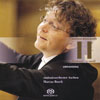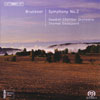Bruckner Symphony No 2
Two editions and two different approaches to Bruckner’s Second
View record and artist detailsRecord and Artist Details
Composer or Director: Anton Bruckner
Genre:
Orchestral
Label: Coviello
Magazine Review Date: 5/2011
Media Format: Hybrid SACD
Media Runtime: 0
Mastering:
Stereo
DDD
Catalogue Number: COV31015

Tracks:
| Composition | Artist Credit |
|---|---|
| Symphony No. 2 |
Anton Bruckner, Composer
Aachen Symphony Orchestra Anton Bruckner, Composer Marcus Bosch, Conductor |
Composer or Director: Anton Bruckner
Genre:
Orchestral
Label: BIS
Magazine Review Date: 5/2011
Media Format: Hybrid SACD
Media Runtime: 0
Mastering:
Stereo
DDD
Catalogue Number: BISSACD1829

Tracks:
| Composition | Artist Credit |
|---|---|
| Symphony No. 2 |
Anton Bruckner, Composer
Anton Bruckner, Composer Swedish Chamber Orchestra Thomas Dausgaard, Conductor |
Author: Rob Cowan
Discover the world's largest classical music catalogue with Presto Music.

Gramophone Digital Club
- Digital Edition
- Digital Archive
- Reviews Database
- Full website access
From £8.75 / month
Subscribe
Gramophone Full Club
- Print Edition
- Digital Edition
- Digital Archive
- Reviews Database
- Full website access
From £11.00 / month
Subscribe
If you are a library, university or other organisation that would be interested in an institutional subscription to Gramophone please click here for further information.




